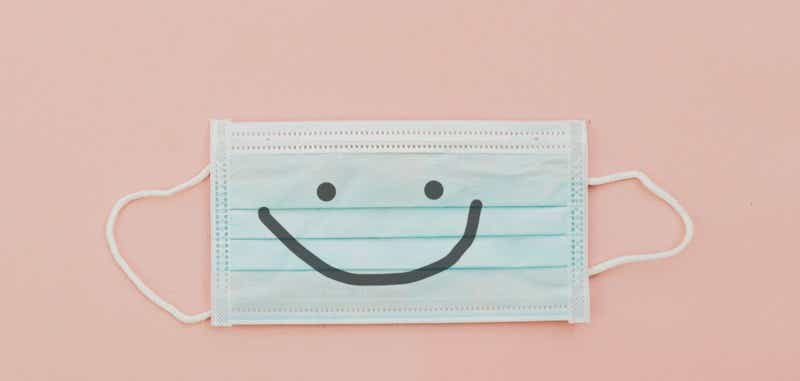Writer Leslie Gray Streeter on not always taking this serious time so seriously
Today, for my Wake-Up Call newsletter (subscribe here!), writer Leslie Gray Streeter reflects on how laughter helped her grapple with the grief surrounding her young husband’s sudden death — and how it might help us all get through the pandemic.
I think we can all agree that there is absolutely nothing funny about a global pandemic. Frightening, deadly and world-shattering? Yes. Side-splitting? Only if we’re talking about ulcers.
Still, as humans, all of our natural defense mechanisms come into play in a time of stress, and Lord knows we’re in one. So it makes sense that along with panic, weeping, and compulsive 3 a.m. cake binges, our psyches would cling to any expression of relief, including laughter — even the weary, desperate, ironic kind. And finding the funny in a crisis isn’t just a defense mechanism; it’s a healthy choice. In “Humor Matters,” Dr. Steven Sultanoff of Pepperdine University tells us that “humor is one of the healthiest and most powerful methods to help provide perspective on life’s difficult experiences, and it is frequently shared during periods of crisis.” See? We have to find a way to keep our sense of humor through all of this. Doctor’s orders!
But how do we access that humor during the most serious health crisis most of us have ever experienced without seeming at best, insensitive, and at worst, sadistic? Glad you asked.
1. Realize that laughing through pain is different from laughing at it:
There’s a line in Barenaked Ladies’ “One Week” where the narrator admits that he’s “the kind of guy that laughs at a funeral.” As a participant in many funerals, including that of my 44-year-old husband Scott’s, after he died of a sudden heart attack, I can tell you that moments of silliness helped me get through all of them. Whether it was my husband’s cousin starting a sing-along to “The Jefferson” theme during his eulogy, the funeral director calling my grandfather by the wrong name at his burial, or my baby cousin peeing in the middle of a great-aunt’s wake — laughter spontaneously broke up the tears, at least for a moment. Also, strategic baby pee can be hilarious.
2. If ever there was a time for sharing stupid memes, it’s now:
I spent several hours recently refreshing my Facebook feed to see which of my friends and family had taken part in a new social media challenge. The goal was to recreate a meme of a fur and sunglasses-clad woman haughtily hoisting a glass of champagne on what appears to be a jet, using whatever household items they had in their coronavirus exile. (My favorite was of my friend with a tea towel on her head holding a box of pasta aloft like it was Cristal.) Not only did it show the hysterical futility of being fabulous in day-old yoga pants, but participating in a dumb challenge that took approximately 60 seconds seemed like a relatively harmless way to find connection with people.
3. There’s something sneakily funny in our binge-watching:
The Observer noted a Parrot Analytics study that people streamed sci-fi and fantasy the most during March. But at the top of the list was Netflix’s Stranger Things, which constantly inserts funny moments to break up the tension. In my completely unscientific opinion, that’s similar to seeking out something to laugh at in the midst of uncertainty.
4. Sometimes our most basic impulses are funny and we should go with it:
In the very first chapter of my memoir Black Widow, I realize that I am hungry for the first time, a day after Scott’s death. That this realization comes as I’m standing in a cemetery deciding where Scott will be buried doesn’t stop me from grabbing a bag of potato chips from one of my friends’ purses and tearing into it like a blazer-wearing jackal right there next to the crypts, even as my mother entreated me to stop dropping chips on the dead people. Just like my baby cousin peeing at the funeral because she had no idea what a funeral was, but she knew she needed to pee, my body knew it needed food to sustain me through the marathon of mourning to come. And there were chips. And it was funny.
5. Give yourself a freaking break:
We are in an unprecedented moment, one that we are trying to survive while knowing that our loved ones might not. And that’s terrifying. We’re grieving, not only for the loss of life, but for the pre-coronavirus world we lived in and for any sense of control we may have thought we had. During the most intense parts of my mourning process over my husband’s death, I decided to give myself permission to feel whatever the heck I was feeling as a means of survival, like with the graveyard chips. You have not stopped being human in the middle of this crisis. In fact, by stripping away all of the things we mistakenly thought we couldn’t live without (like pants), and putting us back in touch with what truly matters, in some ways this epidemic has put us more in touch with our humanity. And it’s what, along with social distancing and common sense, is hopefully what’s going to get us through.
This originally appeared on Medium.com









